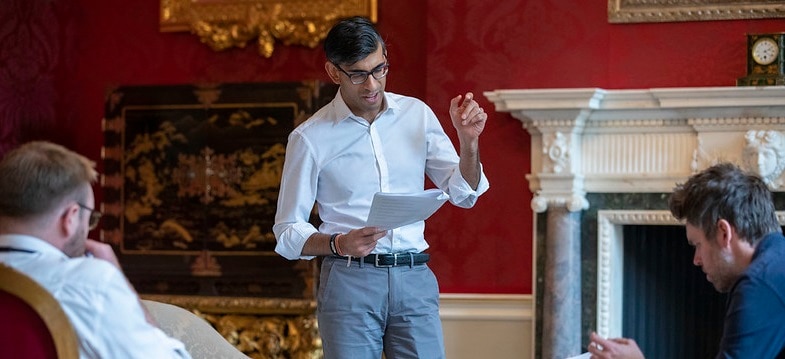D-Day for Rishi Sunak: What do City insiders expect from the Autumn Budget?

In today’s Autumn Budget, Chancellor Rishi Sunak will outline how he plans to “drive growth while keeping the public finances on a sustainable path”.
City A.M. checked in with a number of Square Mile professionals this morning to see what they hope or expect the Budget will bring today.
VAT
Yesterday the news broke that there will be no reduction in VAT on household energy bills in the autumn budget today.
Sue Rathmell, a partner at MHA MacIntyre Hudson, believes Sunak made the right decision.
“The Treasury made the right call: cutting VAT on energy bills was not the best approach. The recent increase in domestic fuel bills will be best dealt with by targeted subsidies rather than a VAT rate cut, as the government notes,” she shared.
If the Chancellor had cut VAT on energy, that would have been a bad message to send to the world’s leaders who will soon be arriving in the UK for COP26. We need policies that will reduce energy use, not encourage it.
Sue Rathmell, partner at MHA MacIntyre Hudso
However, a permanent VAT cut for the travel and hospitality sector may be a wiser move, she argued.
“VAT should not stay as it is. The tourism and hospitality industry ought to get a VAT reduction in the upcoming budget. The sector benefitted from a reduction in VAT over the last 15 months but is now seeing that advantage eroded, with the rate of 12.5 per cent imposed from 1 October 2021 and a return to 20 per cent from 1 April 2022.
“Lower VAT costs for hotels, restaurant and tourist centres encourage people to holiday in their own country instead of going abroad, boosting income across the whole nation and cutting down emissions from air travel,” Rathmell said.
Capital gains tax
With tax and pension reforms among the changes rumoured, Andy Butcher, branch principle and chartered financial planner at Raymond James, zooms in on capital gains tax.
“Capital Gains Tax was rumoured to be an easy target at the last Budget, then surprisingly was left alone, but that didn’t stop many wealthy individuals taking pre-emptive action back in March, when the rumours were rife, to realise gains and pay tax before a potential hike,” Butcher said.
“One would hope that any change to CGT would be well telegraphed, and people would be given a grace period to act before the change was made, but it’s precisely this uncertainty that is leading to action, allowing the Chancellor to chalk up the increased tax revenue as a win, without implementing an actual tax rise,” he added.
Pensions
In addition to taxes, Butcher singled out pensions. “We have a building retirement crisis, so encouraging saving for the future should be high on the government’s agenda,” he said.
Pension saving is deferring tax, not avoiding tax, and this formula has gone a long way to improve savings rates in the UK
Andy Butcher
Among the changes mooted include a proposal to make pensions form part of an individual’s estate, which would likely increase tax revenues in the short term but would be detrimental to the pension industry and savings in general, he continued.
Business rates
Commenting on prospects for business rates measures featuring in tomorrow’s Budget, Lee Nuttall, head of tax at law firm Gowling said that “with murmurs that the government’s long-overdue overhaul of the business rates system will be further delayed, dismayed retailers will be crying out for a further extension to the holiday period beyond the end of this year.”
He added that “the beleaguered High Street badly needs a substantive and joined up approach to business rates that will lower overall bills and significantly reduce the burden that weighs so disproportionately heavily on the retail sector.”

National living wage
As part of the Budget, an early announcement was made that National Living Wage is set to increase to £9.50 to coincide with the rise in the cost of living.
Amanda Simpson, CEO of one of business service specialist, SVC Solutions, believes that although any wage increase can help the current economy, it won’t solve the problems now facing the UK’s jobs market.
“Brexit and the Covid-19 pandemic created a perfect storm that has resulted in a serious labour shortage within the UK. Raising the National Living Wage to £9.50 per hour will not on its own alleviate the pressure on the jobs market, particularly as any impact from this will not come into effect until next April.”
Simpson told City A.M. this morning: “Many of the European workers previously working in the UK have returned, or taken up roles in countries such as Germany which is offering better rates of pay than the UK.”
“With this in mind a simple hike in wages is not going to attract an influx of labour. The Government needs to support UK businesses in making jobs more attractive,” she argued.
Simpson believes this could include adapting roles to fit a more flexible lifestyle, to investing in training to try and close the skills gap.
‘Build back better’ pledge
Elona Mortimer-Zhika, the CEO of IRIS Software Group, one of the UK’s largest privately-owned software companies, shared her predictions with City A.M. this morning.
“The government’s “build back better” pledge needs to be at the heart of the budget if it is to actually make a real difference. Now is not the time to get lost in false promises and commit large sums to only put the funds into reverse in a few month’s time.”
Mortimer-Zhika said: “We know there are undoubtedly going to be tax increases – someone has to pay for the extortionate Covid debt – but it’s important any changes are phased in over time to minimise economic collateral damage. This will give businesses time to focus on productivity, engagement, and most importantly, growing their business from strength to strength.”
To Mortimer-Zhika, “empathy is key here,” as she explained many businesses have only just started their road to recovery.
“The government must keep any promises the chancellor makes on Wednesday. If they don’t, what little trust they have will be lost, and we risk a failing economy that could take years to recover,” she added.
‘Exploiting’ Brexit
Steve Taklalsingh, managing director & CFO of Amaiz, a banking app, believes Sunak needs to look at the visa scheme for EU nationals.
“This is not just about getting more HGV drivers, but many other sectors, particularly some of the most innovative, such as tech companies, are struggling with skills shortages caused by Brexit. It will hold back our recovery if these businesses don’t get the people they need,” Taklalsingh said.
In addition, he hopes the government will reconsider IR35, which “many believe is the primary cause of skills shortages, but I’ve seen no indication that they recognise the problems with the measure yet.”
Brexit is not all negative, Taklalsingh continued, as he said that for the Chancellor to give a boost to the economy, without over inflating it or sending the country into more debt, Sunak should “be exploiting the few advantages of leaving the EU.”
“One way of doing that is to increase the venture capital tax relief for investors, EIS, SEIS, which was previously bound by EU rules,” he explained.